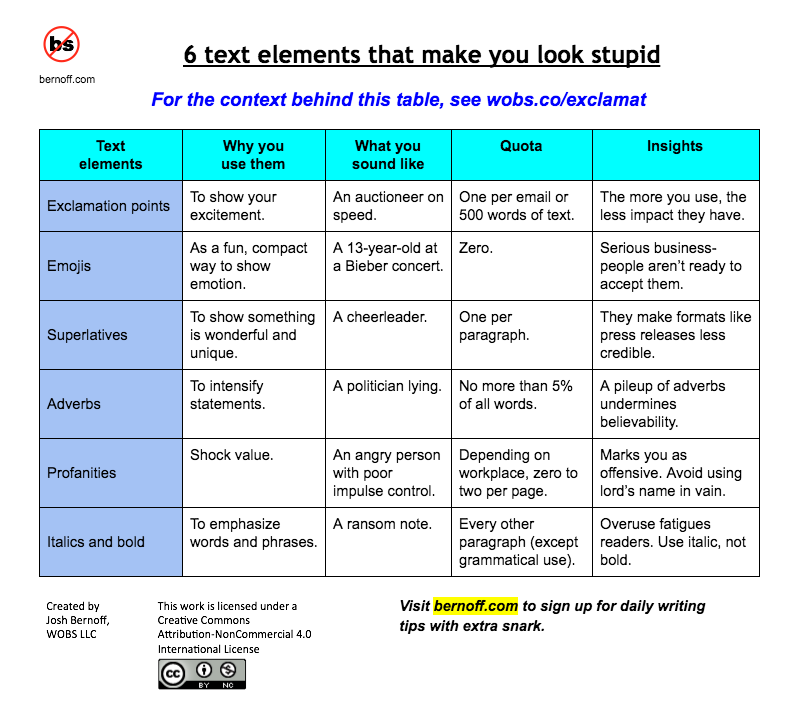Never use an exclamation point! (And other rhetorical no-nos)

If you want to sound like an immature, unprofessional idiot, fill your prose with exclamation points, emojis, superlatives, adverbs, and profanity. Today I’ll explain why people use these rhetorical techniques and how they undermine your meaning.
There are no absolute rules about business writing. You are welcome to use any of the elements I describe here. I do. But avoid leaning on them as a crutch instead of facing up to the need to communicate actual content, clearly. Treat the elements in the list below like cinnamon — a little can spice things up, but a lot just draws attention to lack of cooking skill.
I’ve included a chart at the end for easy reference.
Exclamation points
Why you use them: You want to emphasize something, or show how excited you are.
For example:
We hit quota! This is the third month in a row! Congratulations, everybody!
Do not leave leftover guacamole on the counter! It attracts flies, mice, and vultures!
You really should hire this woman! She’s so talented in so many ways! We will never have an opportunity this good again!
How you sound: Like a hyperventilating auctioneer attempting to get attention on an active airport taxiway.
Your quota: Use at most one exclamation point per email. Don’t use more than one per 500 words of text.
Psychology behind them: People use exclamation points for emphasis, but the more you use, the more you tire out the reader. It’s better to make powerful points with short, pointed sentences that make you look intelligent, rather than manic.
Emojis
Why you use them: They’re fun and express emotions efficiently.
For example:
We got an excellent review in the trade press
I was so grateful that you hit the deadline on this — very helpful.
How you sound: Like a thirteen-year-old girl at a Justin Bieber concert.
Your quota: Zero. Emojis don’t belong in business writing at all.
Psychology behind them: Emojis vastly increase your ability to express your emotional state. But while emotion has its place in business, these graphical expressions of emotion emphasize the emotion over the content. Serious businesspeople (especially anyone over 30) aren’t ready to accept these as a part of business discourse.
Superlatives
Why you use them: You want to show something is truly wonderful and unique.
For example:
This spectacular venue is the first of its kind and the most amazing location ever to open in Brooklyn.
Margot is the smartest, most experienced, cleverest coder on the planet.
How you sound: Like a cheerleader.
Your quota: One superlative per paragraph is plenty.
Psychology behind them: You’d like to emphasize how great something is. But like all expressions of enthusiasm, the more superlatives you use, the more you undermine your credibility. Press releases, especially, overuse superlatives to poor effect. Statistics work better than superlatives to make a point persuasively.
Adverbs
Why you use them: You want to intensify what you’re saying to make it sound more true.
For example:
This trend is deeply upsetting and promises to become vastly more troubling in the future.
I’m extremely concerned about your very challenging situation.
How you sound: Like a politician lying.
Your quota: No more than 5% of the words you use should be adverbs. Never use more than one per sentence.
Psychology behind them: You use adverbs to make something sound more intense, but like all weasel words, the more they pile up, the less believable they are.
Profanities
Why you use them: You want to shock people into seeing how intensely you feel about something.
For example:
I’ve fucking had it with these motherfucking snakes on this motherfucking plane.
His speech was utter bullshit.
How you sound: Like a cliche hardbitten action-movie character. Angry and out of control.
Your quota: Highly dependent on your audience. If your workplace is profanity-tolerant, then you may be able to get away with one or two profanities per page. If it’s not, then avoid them (you could get fired). Some religious people find the use of the lord’s name in vain to be particularly offensive (it does violate one of the Ten Commandments), so avoid using God or Jesus as an intensifier or interjection in spoken or written communication.
Psychology behind them: Businesspeople — in my experience, mostly men — use profanities to get attention and express intensity. In any given workplace, this use tends to expand as people try to top each other. This leaves out and offends those who are unwilling to use these words, based on their upbringing and particular sensibilities. In the end, overuse of profanities marks you as someone who brings more heat than light to arguments — and like exclamation points, superlatives, and adverbs, the more you use, the less effective they are.
Obligatory and self-serving note: Obviously, given the name of this blog, I use one taboo word from time to time: bullshit. It has a precise definition for me (“any form of communication that fails to clearly and accurately transmit meaning”) and I felt it was the best way to describe what I was saying. I do not gratuitously use profanity. However, by using “bullshit,” I have limited my audience and alienated a few people. I made this choice consciously. If you’re thoughtful in how you use profanity and don’t mind alienating people, you may make the same choice.
Italics and bold
Why you use them: To emphasize words and phrases.
For example:
When does this make sense? Never. There is no good reason for this sort of offensive behavior.
Stop this instant. Stop. Stop. Stop!
How you sound: Like a ransom-note.
Your quota: Unlimited, for grammatical reasons (italic for book titles and foreign words, bold for openers to bullets and paragraphs like this one). But when used for emphasis, use italic no more than once every couple paragraphs. Avoid using bold for emphasis — it’s not grammatical and makes you look like an amateur.
Psychology behind them: Ever since it became easy to change fonts and styles, people have liked to play with them. Italic is a great way to show emphasis, but like any other technique, it fatigues the reader with overuse.
—
The table below summarizes these reasons.

Great insight. I’ve seen ALL CAPS overused as well.
WOBS worthy post Josh – and I might have used an exclamation point;^). The latter was an emoji substitute.
During my Junior year at Baylor, I turned in a paper to one of my geology professors. He later pulled me aside in the hallway and explained the use of “very” within scientific documents this way:
“Whenever you feel compelled to use the word “very” in a sentence, first try substituting the word “goddamned” and see how that works. Goes for other adverbs, too.”
I wasn’t sure what he was getting at, and then he handed me my graded paper. The word “very” and other adverbs were circled throughout my document. There were a lot of circles. The grade I received on the paper wasn’t that particularly high.
“I love geology just like you do, so you don’t have to hype it up. I know you understand the topic, but all those adverbs you used make me feel you’re goddamned ignorant.”
Lesson learned.
Supposedly Mark Twain came up with that substitution of “damned” for “very”.
How do you feel about people using *starred* words for emphasis instead of italics or bold. I started using stars back on Usenet when the only browsers were text only. I still kind of like them aesthetically, sparingly, for blogs and emails.
Doesn’t matter whether you use stars instead of italics — you still want to use it infrequently.
Given how platforms support italic and bold now, seems like starred words is sort of a geek programmer thing at this point.
Learned something. I use exclamations a lot. I agree that the more they are used the less effective they become.
Meant to say, “I use exclamations A LOT!!! I agree that the more they are used the less effective they become.”
Mea Culpa – ’tis a sin I commit all the time, but in emails to personal of friends and family. But lately, I’ve ventured outside this group to post some comments on blogs to which I’m subscribed, These are usually of a congratulatory or supportive nature. Now I am wondering if I need to curb my enthusiasm in these more public domains? And, what about in memoir essays or personal stories? I would (really) value your advice . . . oh it was so tempting to end with an exclamation point(and even wondered if “really” needed to be there…., but, yes, I am eager to hear back on this. Now I am bursting with exclamation points and lots of very’s and can hardly contain a “laughing out loud”….
Certainly elements like exclamation points are more acceptable in an informal setting . . . but people still overdo it. Think twice before posting those exclamations.
Thank you Josh. I will henceforth be mindful of your good advice.
EVERY since it became easy to change fonts and styles, people have LIKE to play with them. And I quote! Josh, time to hire a new editor..
Shamefully careless. Thanks for pointing out.
This is also referred to as aggressive punctuation. I do not hire people that use aggressive punctuation outside story books and have at times terminated people that utilize this behavior in their business communications. I consider the use of exclamation marks outside of a story book as a sign of self centeredness that often leads to passive aggressive behaviour. Perhaps good traits if your in an industry that requires narcissistic people to put others in their place. However due to the way and tone exclamation marks are commonly used today amidst an unstable society, It’s been my experience that this kind of aggressive punctuation is considered undesirable in most respected places.